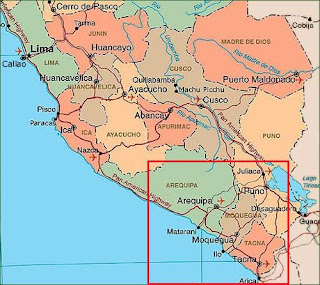By Inés Hayes, with reports from Montevideo by Cristina Camusso and Julio Louis.
latin america
By Carlos Quiroz, peruanista.blogspot.com
June 19, 2008 (updated June 26) -- The videos you are about to see are a bit shocking. For 18 months the people of the Moquegua region (southeastern Peru) and the mining workers from that region have been seeking for peaceful negotiations with the Peruvian government in Lima.
Text and photos by David Bacon
SANTIAGO DE JUXTLAHUACA, OAXACA, MEXICO
MAY 31, 2008 -- The assembly of the Indigenous Front of Binational Organisations in the Mixteca region of Oaxaca, one of the poorest areas in Mexico. A large percentage of the indigenous population of Oaxaca and other states has left to work in northern Mexico and in the United States. The FIOB is a political organisation of indigenous communities and migrants, with chapters in Mexico and the US. It advocates for the rights of migrants, and for the right not to migrate -- for economic development which would enable people to stay home.
By Álvaro García Linera, vice-president of Bolivia
Translation, notes and introduction by Richard Fidler
By John Riddell
June 16, 2008 -- Over the past decade, a new rise of mass struggles in Latin America has sparked an encounter between revolutionists of that region and many of those based in the imperialist countries. In many of these struggles, as in Bolivia under the presidency of Evo Morales, Indigenous peoples are in the lead.
Latin American revolutionists are enriching Marxism in the field of theory as well as of action. This article offers some introductory comments indicating ways in which their ideas are linking up with and drawing attention to important but little-known aspects of Marxist thought.
By Miguel Lora Fuentes, Bolpress (translation by David Montoute)
How true it is that nothing lasts forever. Bolivia’s exploited classes, of mainly indigenous origin, are now confronting more than five centuries of exclusion. This territory’s original inhabitants were subjugated by the cross and the sword during the colonial period, they were harassed and had their lands taken from them under the Republic, and their culture was ignored during the bourgeois-democratic revolution of 1952. Now, as they finally take state power by democratic means at the beginning of the 21st century, the dominant minority accuses them of wanting to install the ``first racist, fascist state in Latin America’’.
The current historical juncture is characterised by a profound crisis of the market economy, of liberal democracy and of the very foundations of the old republican colonial state, a monocultural, centralist and exclusionary state that has remained intact since the foundation of the Republic.
The first in a series of occasional Links Dossiers, Links International Journal of Socialist Renewal is making available a selection of its key articles on the exciting development of Venezuela's United Socialist Party
By Domingo Quilez, introduction and translation by Felipe Stuart Cournoyer
June 6, 2008 -- In February, the rift between the Sandinista Renovation Movement (MRS)[1] and the Movement for the Recovery of Sandinismo (MpRS or the Rescate Group)[2] began to widen and become more public. Although still in an electoral alliance, the Rescate Group (whose main leaders are Comandantes Henry Ruiz and Mónica Baltodano) has made clear its disagreement with the MRS policy of trying the embrace the Nicaraguan Liberal Alliance Party (ALN) and Eduardo Montealegre in some kind of electoral alliance or ``movement against the dictatorship'' (meaning the presidency of the FSLN's Daniel Ortega). Montealegre's decision to run as Managua mayoralty candidate for Arnoldo Alemán's Constitutional Liberal Party (PLC) has put the skids under any electoral MRS alliance with him and the ALN that he formerly led. The ALN is now tangoing with the Sandinista National Liberation Front (FSLN).
The MpRS is endorsing the MRS candidates in the November municipal elections, but it is apparent that differences continue to surface between these allies.
[This article first appeared in the Democratic Socialist Party's internal discussion bulletin The Activist - Volume 10, Number 9, October 2000.]

